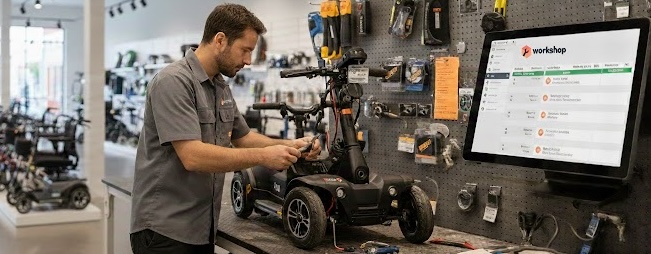February 22, 2026
•
8 minute read
how to start a mobile bike repairs shop uk
You love cycling and have always dreamed of turning that passion into a thriving business.
Jake Fieldsend
Founder & CFO
You love cycling and have always dreamed of turning that passion into a thriving business. Starting a mobile bike repairs shop in the UK might just be your ideal venture. As bicycles continue to gain popularity amid environmental consciousness, there's an increasing demand for convenient and quality bike repair services. But where do you begin? What steps should you take to ensure everything runs smoothly from day one? Let's explore what you need to know, from understanding legal requirements to setting up your shop and building a loyal customer base.
1. Laying the Foundations
1.1 What Do You Need to Start?
First things first, you’ll need a clear plan. Jumping in without preparation is a recipe for failure. Start by outlining your business goals and target market. Are you focusing on urban commuters who need quick fixes, or are you targeting weekend cyclists needing comprehensive maintenance? Once that's sorted, draft a business plan to guide your operations and secure funding if needed.
- Consider Your Investment: Work out initial costs, including tools, vehicle customisation, and marketing. According to a recent study by Cycle UK, starting costs average around £5,000 to £8,000.
- Define Your Services: Whether offering quick tune-ups or complete overhauls, know what you’ll specialise in to attract your ideal customer.
Pro-tip: Start small to minimise initial expenses—not all services need to be available immediately. Expand as you establish yourself and understand local demand.
1.2 Understanding UK Regulations for Mobile Bike Shops
Navigating UK regulations might seem daunting, but they’re essentially about ensuring customer safety and fair trading. The most crucial regulations involve mobile trading licences, Health and Safety guidelines, and environmental responsibilities such as waste disposal.
- Check Licensing Requirements: Different councils have different rules. Ensure you get the relevant permits specific to mobile operations in your city or town.
- Comply With Environmental Guidelines: Properly disposing of waste, such as oil and tyres, is not only ethical but necessary under UK law. Failure to comply can result in hefty fines.
Pro-tip: Connect with local business groups or chambers of commerce—they can offer invaluable insights and might even have resources to assist with compliance.
1.3 Setting Up Your Business Legally
Establishing your business legally is crucial to avoid future headaches. Begin by registering your enterprise with the UK government. Decide whether to operate as a sole trader, a partnership, or a limited company.
- Register Your Business: Make it official through HM Revenue and Customs for tax purposes. Don't overlook VAT registration if you expect turnover over £85,000.
- Secure Insurance: Protect your assets and peace of mind with public liability insurance, which is vital if you’re dealing with customers’ bikes and potential accidents.
Pro-tip: Consult with a business advisor or legal consultant to ensure all your bases are covered and avoid starting on the wrong foot.
By starting smartly and methodically laying down your business's foundations, you’re well on your way to joining the UK’s vibrant mobile bike repair sector. Let’s build on that base going forward!
2. Equipping Your Mobile Bike Repair Shop
2.1 Choosing the Right Tools and Parts
When launching a mobile bike repair service, selecting the right tools and parts is non-negotiable. You need to consider the types of repairs you're expecting to perform most often and build your toolkit around them. For instance, having a calibrated torque wrench, a reliable chain tool, and a multi-purpose bike repair stand will cater to a majority of issues. Don’t skip on quality — investing in durable tools will save you time and money in the long run.
Moreover, securing a reliable source for bike parts is equally crucial. You don't want to be left stranded during a busy period without readily available components like brake pads, tubes, or cables. Establish ties with local suppliers and consider partnerships with companies that can deliver quickly. It’s also advisable to carry some stock of common parts for immediate customer satisfaction.
Pro-tip: Create a checklist of essential tools and frequently required parts. Regularly update inventory to prevent shortfalls during peak seasons.
2.2 The Importance of a Reliable Vehicle
Your vehicle choice is the backbone of your mobile bike repair business. Opt for a van that supports not just your tools and spare parts but also ensures organisation. A well-organised vehicle allows for quick access during jobs, reducing downtime. Think of installing shelving or drawers to keep your operation tidy.
Consider fuel efficiency and insurance costs when choosing the vehicle. A smaller van may be economical, but ensure it’s spacious enough for essential gear. Don’t forget to think about distinctive branding. Wrap your vehicle with eye-catching graphics; it’s a mobile billboard. Locals may spot your service as you drive through different areas, broadening your customer base.
Pro-tip: Use rubber floor mats and secure tool cases to protect your van’s interior from damage. This keeps your vehicle in prime condition, maintaining its resale value.
2.3 How Bikebook Can Support Your Equipment Needs
Managing and sourcing equipment can be overwhelming, but Bikebook offers an innovative platform that alleviates these woes. Bikebook connects you with local mechanics and suppliers ensuring you have access to quality parts swiftly, minimising downtime. This instantaneous connectivity can transform how you manage inventory and repairs.
We make the process of finding reliable bike parts simpler. Our platform acts as a one-stop-shop for sourcing and consulting with local experts. With real reviews from other mechanics, making informed decisions is now straightforward. Instead of worrying about parts availability, concentrate on providing excellent service.
Pro-tip: Utilise Bikebook for booking repairs to fill schedule gaps, ensuring maximum use of your time. The more services you book, the more equipment needs arise, but with Bikebook, you’re always prepared.
3. Marketing Your Mobile Bike Repairs Shop in the UK
3.1 Building an Online Presence
Creating an online presence isn't just crucial—it's non-negotiable. Start by setting up a professional website with easy navigation and clear contact information. Make use of search engine optimisation (SEO) to ensure your business appears in relevant search results. Think about what your potential customers are typing into Google, like "best mobile bike repairs near me," and use these keywords naturally throughout your site pages.
Social media is a powerhouse for engaging with your community. Set up profiles on platforms like Instagram and Facebook to showcase your services, share engaging bike maintenance tips, and post client testimonials. Regular updates keep your audience engaged and help build your brand. Don't hesitate to utilise Google My Business for boosting local SEO and appearing in maps searches.
Pro-tip: Use Google Analytics to track which marketing channels bring the most visitors to your site. Adjust your strategy based on these insights.
3.2 Utilising Bikebook to Reach Customers
Reaching customers has never been easier than with Bikebook, a dedicated platform designed specifically for bike mechanics. It connects you directly with local cycling enthusiasts searching for reliable mobile bike repairs. Listing your business here not only elevates your visibility but lets potential clients easily find and compare your services.
Bikebook simplifies the connection process—potential customers can use its intuitive search feature to find mechanics in their area. You’re getting direct exposure to those who are actively searching for the services you provide. Moreover, the platform supports a community of local businesses, encouraging customers to choose nearby services over large, national chains.
Pro-tip: Encourage satisfied clients to leave reviews on Bikebook. Positive feedback can significantly enhance your credibility and attract new customers.
3.3 Networking and Local Community Engagement
Engaging with your local community is the backbone of building a loyal customer base. Start by attending events like cycling races, local bike fairs, or organising workshops where you can demonstrate quick repair tips. Not only does this spread awareness of your services, but it positions you as a helpful resource within the community.
Form partnerships with local cycling clubs and businesses. Offer exclusive discounts for their members or collaborative events. This builds strong local ties and spreads your business by word of mouth. Being active in your community boosts your brand recognition beyond digital screens and cultivates a genuine connection with customers.
Pro-tip: Consider sponsoring a local cycling event. This not only showcases your commitment to the cycling community but also provides excellent visibility for your business.
To capture and retain a loyal customer base in the mobile bike repair market, it's essential to have a comprehensive marketing strategy. Start by building a robust online presence, leverage platforms like Bikebook to directly reach those in need of your services, and foster strong ties with the local cycling community. These methods not only help establish your brand but ensure sustainable growth in your business journey.
Looking to streamline your bike repair service operations? Check out our advanced Bike Shop Management Software at Bikebook.
Frequently Asked Questions
How do I become a bike mechanic UK?
To become a bike mechanic in the UK, start by gaining hands-on experience with bikes, perhaps through a volunteering role. Consider enrolling in a course such as those offered by Cytech, which is well-recognised in the UK bike industry. Obtain practical knowledge by training under experienced mechanics.
How does a bike mechanic work?
A bike mechanic diagnoses issues, performs repairs, and maintains bicycles for optimal performance. They utilise tools like wrenches and screwdrivers to adjust brakes, gears, and bearings and replace worn parts. Accuracy and attention to detail are key skills in this role.
How do I start riding a bike UK?
Start with choosing a suitable bike and protective gear. Find a safe, open space to practice basic riding skills such as balancing, steering, and braking. Joining local clubs can provide support and lessons to enhance your skills. Follow UK cycling laws and guidelines for safe rides.
What is a bike mechanic?
Bike mechanics are professionals who repair and maintain bicycles, ensuring they are safe and functional. They handle tasks like adjusting brakes, repairing flat tyres, tuning gears, and conducting routine check-ups. Their expertise ensures your bike’s performance and longevity.



